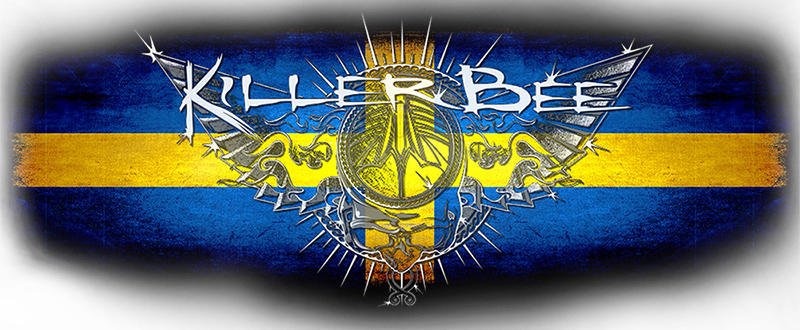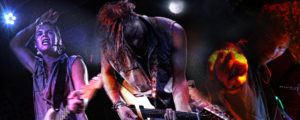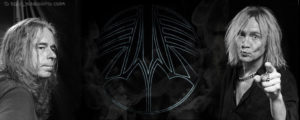
Brian Frank has been working for his entire adult life as professional hard rock singer and songwriter, but it seems that with the latest album by his band Killer Bee, Eye in the Sky, he and his bandmates are started to get the respect, critical acclaim and popularity that they rightly deserve.
Although Frank and his primary songwriting partner Anders Ronnblom have been honing their craft as musicians and composers of what many would describe as ‘old school,’ Deep Purple-esque 1970s inspired raw, gritty hard rock music, the public seems to finally be coming around to Killer Bee’s appeal and their straightforward and eminently authentic approach to music.
“I think for the longest time people didn’t think of us as a ‘polished’ band, which seemed to be what has been popular for the last number of years in both pop and heavy rock music. I think for years we were kind of overlooked by the mainstream because we’ve always been trudging our own trails and we’re not really the type of band that conforms with what is popular at the time. So we’re outside the pack and always have been, but most people tend to look at what’s in the middle of the pack instead of what is off the path. Most people don’t look outside the box they’ve been given,” said the Toronto-born Frank from his home in Ornskoldsvik, Sweden, hometown of hockey legends like Peter Forsberg and the Sedin twins.
“I think now, with this third record for Killer Bee, people are starting to really identify with the sound that we’re creating. A lot of the music today is tiresome in many ways. And that’s not a criticism on the bands, but a criticism of modern production. And I am not 100 per cent sure why this album has caught people’s attention because we’re not doing anything differently. The vibe is always the same – it’s raw and full of passion and energy. In a lot of the reviews for Eye in the Sky they’re saying, ‘well, I have heard the last couple of albums but now I am starting to get it.’ I think it’s a slow burn and it’s taken a shift in what people are looking for in music for people to really understand what we’re doing.”
As Killer Bee, Frank and Ronnblom released From Hell and Back in 2012 and Evolutionary Children in 2013, as well as some compilation albums from their previous band Desert Rain and an earlier incarnation of Killer Bee that broke up in 1998 after some shady business shenanigans brought the band to a grinding halt. Over a seven year period, from 1991 through 1998, the band released four studio albums, garnering a number one hit in a number of European countries with the song Take Me Home off their 1993 album Raw.
After working on a number of other musical endeavours for 12 years, Frank, Ronnblom and a new crop of musicians reformed Killer Bee, and they haven’t looked back. The current line-up features keyboardist Denny Demarchi, guitarists Andre Hagglund and Christoffer Sjostrom, as well as drummer Shawn Duncan.
The heart of Killer Bee is the musical partnership between Frank and his long-time creative confrere Ronnblom, which has endured through various trials, tribulations and incarnations for more than three decades. And the relationship started off in a rather innocuous fashion, but the repercussions would be long lasting and would be the spark that led Frank to leave his home and native land for Sweden, where he has happily resided for a quarter of a century.
“I was playing in a band called Rapid Tears in Toronto. We were an underground heavy metal, all-original band. But I left them in 1984 as I was getting a little tired of the scene because it seemed all people wanted were clone bands and cover bands. Anders made a trip to Toronto in 1985 with his band which was called Firewind at the time [not to be confused with Ozzy guitarist Gus G’s current band, also called Firewind]. They had hooked up with some from singer from Oshawa and had plans to go into a studio and do a recording and try to make their name in Canada. It turned out that the singer ended up being a bit of a loser. I got the impression that he wasn’t a guy to be taken seriously, so they were desperate for someone to do their tracks,” Frank said, adding that the engineer on the recording session knew of Frank, knew he didn’t have a gig at the time and thought he might like to come in and do some vocal work for Firewind.
 “I went in and did four songs for them on a Friday night and they went back to Sweden. But Anders and I kept in contact to the point where two years later, in 1987, I came over here to Sweden for a couple of weeks and we recorded an album’s worth of material before I went back to Toronto. But, again we kept in touch. I was really frustrated by the spring of 1990 and was ready to pack it in. I had been mostly playing metal covers, and it had become boring. So out of the blue I decided to call Anders, and it was funny because he said, ‘I was just going to call you man. I spoke to the other guys in the band and we decided that you’re coming over here to be our singer.’
“I went in and did four songs for them on a Friday night and they went back to Sweden. But Anders and I kept in contact to the point where two years later, in 1987, I came over here to Sweden for a couple of weeks and we recorded an album’s worth of material before I went back to Toronto. But, again we kept in touch. I was really frustrated by the spring of 1990 and was ready to pack it in. I had been mostly playing metal covers, and it had become boring. So out of the blue I decided to call Anders, and it was funny because he said, ‘I was just going to call you man. I spoke to the other guys in the band and we decided that you’re coming over here to be our singer.’
“I thought it was perfect timing, so I packed my bags on the first of June 1990 and came over here and had no intention of returning to Toronto until I could play Maple Leaf Gardens. But that doesn’t exist anymore so I guess I am never going back. I moved over here and I don’t regret for one minute doing it and I never have had a yearning to move back to Toronto. I visit my family a couple of times a year and we do the mixing for our albums there.”
Ronnblom lives a few minutes away and the pair are more like brothers than bandmates these days – or as Frank puts it, more like an old married couple.
“I guess it’s like we’ve had a long engagement and now we’re married for life. And like any marriage there’s ups and downs; there’s scraps and love, but we truly understand one another. And we work so well together, it’s amazing. Every once in a while in the music business you come across somebody where they can hit a chord on the guitar and you can instantly sing a melody and within a few minutes the song is finished. Our first albums together were like that,” Frank said.
“Our very first album was with a band called Desert Rain when I first came over here and I think it took us no longer than 10 or 15 minutes for each song on that album. I remember ironing a shirt one day and he plays a riff and I sing a melody and, boom, the song is finished before the shirt is done. When you have that kind of chemistry you don’t know where it comes from, you can’t explain it – it’s just one of those things that happens. We really kind of know what’s going on in each other’s heads, musically anyway.
“Anders is a great guy. He’s very compassionate and has lots of feelings for other people around him. We have both been through our own trying times, as everybody does in life, and we have supported each other through it and here we are, making the best music we’ve ever made.”
Between Desert Rain and the first incarnation of Killer Bee, Frank and Ronnblom had some amazing experiences, particularly on the concert stage.
“In the 1990s we had a fairly good promoter who, in the end, ended up being terrible and almost ruined us. But while he was doing a good job, he put us on a lot of festivals throughout Europe. It was a real highlight to be on the same stages as people like Rod Stewart, Elton John and especially Page and Plant [Jimmy Page and Robert Plant] because I was a Led Zeppelin freak from way back. And in 1991, I had not been in Sweden for a year and all of a sudden I am in Leningrad and playing on some big beach with 10 bands at a festival. And a year later we’re playing Red Square in Moscow as the headliner. Tell me how I could do that from Toronto? It would never happen. So I have a lot more of those amazing experiences had I not listened to Anders and come over here.”
There was a significant gap between the release of Evolutionary Children and Eye in the Sky. This was primarily due to significant injuries Frank suffered while doing some home repairs.
“Normally the writing process for our albums is pretty quick. Anders comes up with a lot of riffs and sometimes even finished songs and we will sit down and work out some melodies and I will write the lyrics and then we’ll go right into the recording studio with the band, with me as the producer. For this album, it took more than two years to put together and that was due to a lot of extenuating circumstances that had nothing to do with the creative side or the production side,” he explained.
“We had member changes; people that ran into personal problems that meant they had to leave us so we then had to replace their parts and other people had to come in. And then I had my physical problems, some of which are just now starting to clear up four years later. I fell off my roof trying to fix something. It was more stupidity than anything, but I ended up fracturing nine ribs and punctured a lung – it’s pretty hard to breathe, let alone sing with broken ribs and a punctured lung. That happened in early 2013, just after Evolutionary Children came out. And between that and all the other stuff, this record kind of felt cursed. But in the end, it was worth it. I think it’s our best album and we’re getting more attention from it, so I guess sometimes good things can come out of bad situations.”
 Through the good times and the bad, even when Frank and Ronnblom were not recording and touring together, the pair stayed in the music industry working with other artists from time to time. But the connection was always there, as was the camaraderie and it came as little surprise to folks who knew both musicians that they would be working together again as Killer Bee. What has changed is the ultimate motivation for the pair. These days, it’s all about the music.
Through the good times and the bad, even when Frank and Ronnblom were not recording and touring together, the pair stayed in the music industry working with other artists from time to time. But the connection was always there, as was the camaraderie and it came as little surprise to folks who knew both musicians that they would be working together again as Killer Bee. What has changed is the ultimate motivation for the pair. These days, it’s all about the music.
“First of all, Anders and I both know that we’re never going to have a life like 19-year-old rock stars. That’s never going to happen. I think the thing that keeps us going is the fact that we simply love to write and play music, and that’s something you can never stop doing. You are just compelled to do it. I myself have written some of my own music and Anders has written his own music and played with other people, as have I over that break we had,” Frank said.
“I guess our attitude today is whatever happens, happens. And we’re going to do what we do because it’s what we love and what we know and it puts a smile on our faces just writing the music. And now with this elevated interest that’s happened with Eye in the Sky, it’s like the cherry on top of the cake. The cake has always been there, but it’s nice that somebody is now adding the whipped cream and cherry to our career.”
And it’s a career that still sees Killer Bee touring throughout Europe primarily, although there are two dates scheduled in California early in the New Year. They play in Ramona on Jan. 29, followed by a date at the legendary Whisky A Go Go on Jan. 30. An intensive 14-city tour of the U.K. was also recently announced, starting March 5 in Glasgow before wrapping up in Edinburgh on March 18.
For more information, visit www.killerbee.se.
- Jim Barber is a veteran award-winning journalist and author based in Napanee, ON, who has been writing about music and musicians for a quarter of a century. Besides his journalistic endeavours, he now works as a communications and marketing specialist. Contact him at jimbarberwritingservices@gmail.com
SHARE THIS POST:
